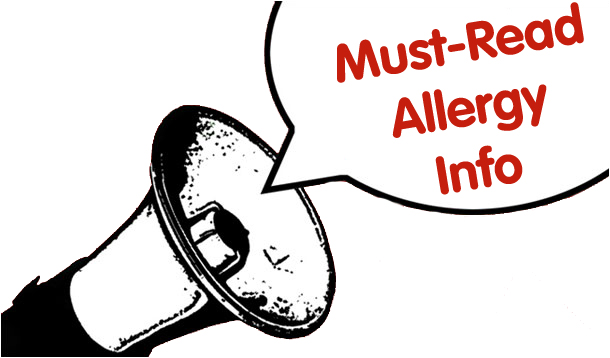
On September 30, 2003 a 13-year-old girl named Sabrina Shannon was taken off life support and died; her cause of death was anaphylaxis. Sabrina went into anaphylactic shock after eating lunch in her school cafeteria. The coroner determined that tongs used to serve Sabrina's French fries had also been used to serve poutine, and that Sabrina's reaction was a result of residue from the cheese curds (she was severely allergic to dairy) left on the tongs. It's unfathomable, isn't it? That a child can die from something so seemingly innocuous? Despite Sabrina being aware of her severe allergies and very diligent in protecting herself, she died as a result of them. I can't even tell you how this terrifies me as the parent of a child with anaphylaxis.
Sending any child to school is a nerve-wracking experience; when severe allergies are involved it's even scarier. In response to their incredible loss, Sabrina's parents lobbied for schools to have better contingency plans in place for students who suffer from severe allergies. On January 1, 2006 An Act to Protect Anaphylactic Students: Sabrina's Law was put into place. It was the first legislation of its kind in the world, aiming to ensure that all school boards have policies and procedures for addressing anaphylaxis and making schools as safe as possible for students with severe allergies.
Sabrina's Law states that each Ontario school must follow board policies for students who suffer from severe allergies. The idea is that the administration and the community work together to create as safe an environment as possible for the at-risk student. The Government of Ontario has a very useful online tutorial for Anaphylaxis Prevention Training that assists in the training for these allergy plans.
Although no school will ever be completely risk-free, if the community works together, they can be much safer. As stated by the Canadian Society of Allergy and Clinical Immunology (CSACI), "Anaphylaxis management is a shared responsibility that includes allergic children, their parents, caregivers, and the entire school community." I stress the community part of that statement, because it's imperative that other families understand the severity of these allergies. We're not asking you to accommodate our child's food preferences, we're asking you to save a life.
CSACI also offers these tips for parents of children with anaphylaxis:
The entire school community should be educated on how to manage anaphylactic allergies and students should know how to protect their peers. CSACI recommends general awareness sessions, assemblies, and special health lessons. In addition, peers must be taught that teasing/bullying allergic students is absolutely intolerable and will be dealt with immediately.
I've been spending time reviewing the resources on the EpiPen website, and recommend it for all parents of at-risk kids. They also have a Facebook group that aims to build a community where those who deal with severe allergies can find helpful information and support. In particular, here is the info I found most helpful, and will be bringing with me to my son's school in September:
This step-by-step registration helper can be used when registering your at-risk child for school. It is also a great idea to use it as a reminder at the beginning of the school year, or to educate new staff.
This plan should be completed and given to your child's school to help ensure staff know what to do in the event of a severe allergic reaction. Included should be your child's photo, allergy details, emergency contact info, emergency protocol, and the signatures of all parents/guardians and your child's physician.
These are samples letters your Principals and teachers can use to notify other families of your child's severe allergy. By educating the other parents, they can help create a safer environment for all our kids.
Working together, we can make our schools safer for kids with severe allergies.
 Severe allergies are on the rise in Canada.
Severe allergies are on the rise in Canada.
This is proudly sponsored by EpiPen®.
EpiPen.ca
The opinions expressed in this post are the opinions of the individual author and may not reflect the opinions of Pfizer Canada, the Canadian distributor of EpiPen. Pfizer Canada reviews all material to ensure medical accuracy of statements.
EpiPen® and EpiPen® Jr (epinephrine) Auto-Injectors are indicated for the emergency treatment of anaphylactic reactions in patients who are determined to be at increased risk for anaphylaxis, including individuals with a history of anaphylactic reactions. Selection of the appropriate dosage strength is determined according to patient body weight.
EpiPen® and EpiPen® Jr Auto-Injectors are designed as emergency supportive therapy only. They are not a replacement for subsequent medical or hospital care. After administration, patients should seek medical attention immediately or go to the emergency room. For the next 48 hours, patients must stay within close proximity to a healthcare facility or where they can call 911. To ensure this product is right for you, always read and follow the label. Please consult the Consumer Information leaflet in your product package for complete dosage and administration instructions.
© 2013 Pfizer Canada Inc., Kirkland, Quebec H9J 2M5 • Toll free: 1-877-EPIPEN1 (1-877-374-7361)
EpiPen®, EpiPen® Jr are registered trademarks of Mylan Inc. licensed exclusively to its wholly-owned affiliate, Mylan Specialty, L.P.; sub-licensee, Pfizer Canada Inc., Kirkland, Quebec H9J 2M5